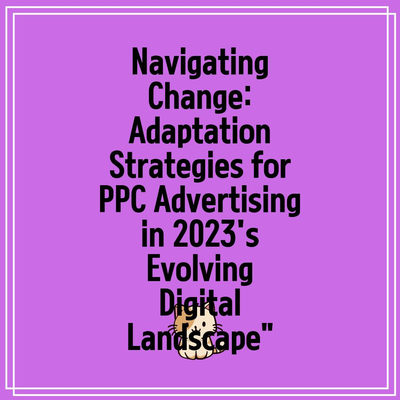
2023 Year in Review: The End of UA and The Google Antitrust Saga
The digital landscape in 2023 has been nothing short of tumultuous, marked by significant shifts that have left marketers and businesses reevaluating their strategies. Two major events that have captured the attention of industry professionals are the conclusion of Universal Analytics (UA) and an ongoing antitrust lawsuit against Google. These developments, coupled with the decline of X (formerly known as Twitter), have reshaped the pay-per-click (PPC) advertising environment. In this article, we delve into the implications of these changes and what they mean for businesses navigating this new digital terrain.
The End of Universal Analytics
As of July 1, 2023, Universal Analytics has officially concluded its services. This was a significant transition for data analysts and digital marketers who relied on UA for tracking and analyzing website performance. The discontinuation marks the shifting paradigm toward Google Analytics 4 (GA4), a platform that brings a host of new features designed to adapt to the evolving landscape of online behavior.
The transition from UA to GA4 is more than just a change in platforms; it necessitates a fundamental shift in how data is collected and interpreted. GA4 focuses on
Moreover, with the new privacy regulations in effect, GA4 is designed to comply with these changes, emphasizing user data privacy without compromising the integrity of data collection. The shift poses a significant learning curve for many businesses, but it also presents opportunities to harness real-time analytics for more effective PPC campaigns. Companies that adapt quickly to GA4 are likely to gain a competitive edge in their comeback strategies, leveraging new tools to optimize their ad spend and improve conversion rates.
The Google Antitrust Litigation
In a notable twist, Google continues to find itself embroiled in antitrust litigation that raises challenges for its business practices. The lawsuit, which has been gaining momentum throughout 2023, centers around accusations of monopolistic behavior in the digital advertising space. Critics argue that Google has unfairly leveraged its dominance in search and advertising services, stifling competition and innovation.
This legal battle carries significant implications for the PPC industry as it calls into question the strategies employed by Google in its ad placements and bidding systems. If regulatory bodies decide to impose changes on Google’s operations, this could potentially lead to a more level playing field for advertisers. A shift in the advertising landscape could result in more innovative approaches among emerging platforms, enabling businesses to diversify their advertising strategies beyond the Google ecosystem.
For advertisers, keeping an eye on this lawsuit is crucial. Depending on its outcome, adjustments may be necessary in how companies approach their PPC campaigns. For instance, advertisers may need to look for alternative platforms where competition can drive innovation and lower costs, rather than relying solely on Google’s vast network.
The Downfall of X (Formerly Twitter)
Meanwhile, in the social media arena, the gradual decline of X continues to unfold. After an aggressive series of changes post-acquisition, many users have expressed dissatisfaction with the platform’s direction, leading to a significant drop in user engagement. As more individuals migrate to alternative social platforms, advertisers must reassess their social media strategies.
The decline of X signals a critical moment for PPC marketing strategies, as businesses must now weigh their investment in various platforms. This situation necessitates exploring new avenues for marketing efforts, including platforms that specifically cater to smaller niches or emerging trends. Companies may benefit from reallocating ad spend towards platforms experiencing growth, rather than risking their budgets on a platform that is losing ground.
Conclusion: Adapting to the New Digital Economy
As 2023 comes to a close, digital marketers find themselves at a crossroads. The termination of UA forces a reevaluation of data tracking methods, while the antitrust concerns surrounding Google raise questions about the future competitiveness of the advertising landscape. Simultaneously, the decline of X highlights the importance of adaptability in a rapidly changing market.
Looking forward, the key for businesses will be to remain agile and open to adopting new technologies and strategies. By embracing GA4, staying informed about regulations affecting competition, and diversifying advertising approaches, companies can effectively navigate this evolving digital environment. As the PPC landscape continues to shift, adapting to change will be the hallmark of successful marketing campaigns in the years to come.


